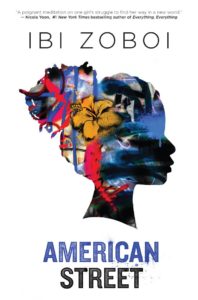 In Ibi Zoboi’s debut novel, American Street, 16-year-old Fabiola Toussaint has just arrived from Haiti to the United States with her mother, but things have gone terribly wrong. While Customs & Border Patrol officials wave Fabiola through—because she was born in the U.S. but returned to Haiti with her mother as a baby—CBP refuses her mother’s visa, and now Fabiola’s mother is on her way to a detention facility while the teenager must make her way alone with her luggage from New York to Detroit where her Matant (Aunt) Jo lives.
In Ibi Zoboi’s debut novel, American Street, 16-year-old Fabiola Toussaint has just arrived from Haiti to the United States with her mother, but things have gone terribly wrong. While Customs & Border Patrol officials wave Fabiola through—because she was born in the U.S. but returned to Haiti with her mother as a baby—CBP refuses her mother’s visa, and now Fabiola’s mother is on her way to a detention facility while the teenager must make her way alone with her luggage from New York to Detroit where her Matant (Aunt) Jo lives.
Matant Jo, a widow with three daughters known in their gang-infested neighborhood as the 3B’s for Brains (Chantal), Brawn (Princess, called Pri), and Beauty (Primadonna, called Donna), has sent for Fabiola and her mother because she needs help. She recently suffered a stroke, and the daughters, too, are struggling. Chantal gave up an opportunity for a university premed program to take care of her family. Pri is getting into fights at school. And Donna is dating the sleazy drug pusher Dray, who beats her and brings her home drunk and drugged. They aren’t eager to have newcomer Fabiola in their lives, and she misses her home and her mother. She finds herself drawn to Bad Leg, the homeless man who sits on the vacant lot across the street reciting verses and stories.
Steeped in the traditions of home, Fabiola sees Bad Leg as Papa Legba, the guardian of the crossroads of the present and the spirit world. His words are portents that guide her. At the same time, she is attracted to Kasim, who runs with Dray but is as kind as Dray is cruel. When a police officer arrives offering a deal, Fabiola is torn between her loyalty to her Detroit family and Kasim, and her desire to see her mother again.
American Street explores a now-familiar story—visa and green card holders detained, often for weeks at airports and other border crossings. The new administration has ramped up detentions, beginning with the travel ban right after the inauguration. In the eyes of many U.S. citizens, residents, and visitors, the law is not longer the law; rather the law is what those in power say it is. Fabiola is a newcomer to this upside-down world, but she is also smart and a survivor. She has already survived a devastating earthquake and violence in Haiti; she knows that the police are not always one’s friend. She also has the world of magic to guide and protect her.
Zoboi, who was born in Haiti, captures a teenage immigrant’s disorientation and the way she draws from her past to make sense of her present. The enthusiasm with which my Haitian students have embraced this book testifies to the importance of this Own Voices narrative, both for the authenticity of the story and the author’s role as inspiration to a new generation of writers and readers.
1 comment for “An Immigrant’s Dilemma in American Street”